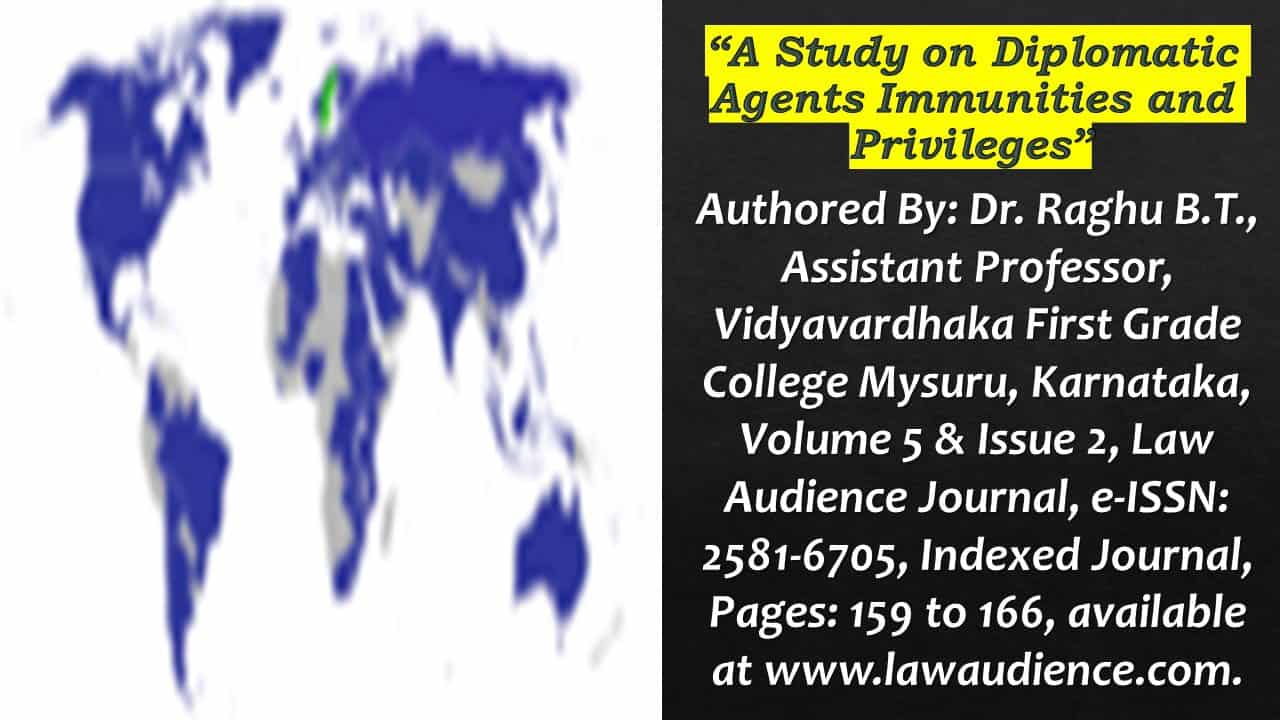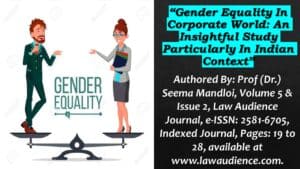Click here to download the full paper (PDF)
Authored By: Dr. Raghu B.T., Assistant Professor, Vidyavardhaka First Grade College Mysuru, Karnataka,
Click here for Copyright Policy.
I. INTRODUCTION:
The majority of States today have foreign representatives. The term “diplomatic agent” referred only to the head of mission but now the term also includes members of staff. Article 1 of the Vienna Convention divides the diplomatic staff into diplomatic agents, which includes the head of the mission, administrative and technical staff, service staff and lastly private servants. The distinction between the different types of diplomats and staff has to be defined owing to the increase in the number of lower-level diplomats and the increase in the number of staff in missions. Furthermore, its significance is accompanied by the notion of reducing the immunity of staff in certain circumstances as opposed to having blanket immunity.
Diplomatic agents are sent by every state all over the world, but all diplomatists are not covered in the same category. Today they have been categorized as ambassadors, High commissioners, charged affairs, Ministers Plenipotentiary, Envoy Extraordinary and so on. Each diplomatic agent has certain duties to perform and responsibilities to discharge based on which each one enjoys certain privileges and immunities as well. Questions of rank, precedence, and protocol once plagued international relations. Sometimes they delayed the conduct of diplomatic business. Persistently they led to friction, and on occasion even brought on the threat of war. In order to reduce such difficulties, the states have ‘gradually developed certain rules and principles governing diplomatic intercourse’. In other words, they have “developed international laws defining common interests and putting certain relationships on an orderly and predictable basis.”7 The Special Rapporteur to the ILC gave identical privileges and immunities to all members of the mission, including the administrative, technical and service staff, provided they were foreign nationals.
II. DIPLOMATIC FUNCTIONS AND DUTIES:
According to Manu “an envoy alone makes allies and separates allies. He performs that functions whereby rules are bought into an alliance or separated.” He has laid down three explicit functions; declaration of war or peace, make or break alliances and should play his part in the foreign land so as not to imperil his personal security.
Kautilaya in his Arthashastra has discussed at some length the duties of an ambassador who is sent to represent his country. Kautilaya laid stress on monarchy and was not favorable inclined to republics. He, therefore, wanted that the powers and position of the monarch should be strengthened. The ambassador, therefore, represented the king and his interest.
Some of the duties and functions that were assigned by Kautilaya are as under:
- Responsibility of delivering the message of master to other sovereign, and duty replay to his master, indicating real treatment of Darbar, receiving sovereign, the extent of his pleasure or wrath and so on.
- Responsibility to see that treaties are properly implemented.
- To give an impression about the increasing power or strength of his sovereign.
- To ensure the number of enemies is reduced.
- Responsibility to reduce friends of the enemy by creating friction.
- To intimate the military strength of the enemy to his sovereign.
- To collect copies of secret treaties concluded by any foreign government against his sovereign.
- To make sure that the enemy was weak, it was his responsibility to see that offensive and aggressive language was used so that the enemy got excited and there was sufficient opportunity to invade the enemy and conquer his territories.
- To make treaties conclude in such a way that the imprisoned spies of his country are released from the prisons Diplomatic Functions and Duties. Responsibility to ensure that the strength of the enemy is destroyed and weakened.
- Responsibility to ensure that the strength of the enemy is destroyed and weakened.
According to Art. 1 of the Vienna Convention on Diplomatic Relations, a diplomatic agent is a person acting in pursuance of a duty bestowed upon him by the sending state. He may be the head of the mission or part of the diplomatic staff accompanying the head of the mission. The two most important terminologies accompanying the definition of diplomatic agents are the sending state and the receiving state. So, the nationality of the diplomatic agent is construed to be the sending state whereas the state into which such a diplomatic agent is sent with a purpose is considered as the receiving state.
III. IMMUNITIES AND PRIVILEGES:
The first privilege is associated with the premise of the mission. The receiving state is under the obligation to protect the premise of the diplomatic mission against intrusion or damage or interference with the established peach inside it. It is also under the obligation to enter the premise only after obtaining consent from the head of the mission. Along with this, the premise means of transport used by the diplomatic agent is immune from search, requisition, attachment or execution. All of this is encompassed in Art. 22. The same goes for the private residence, documents, and properties of the diplomatic agent.
The sending state and the diplomatic agent don’t have to pay any dues or taxes with respect to the premise of their mission whether owned or taken on a lease. The only tax that they have to pay is the tax specified in the laws of the receiving state with respect to persons contracting with the sending State or the head of the mission. This is also applicable to social security. This also extends to the private servants hired by the diplomatic agents. The only restrictions on the applicability of this immunity are if the personal servants are permanent nationals of the receiving state or if they are covered by the social security laws of the sending or a third state[2] (Joshi, 2019).
The inviolability extends to the archive and the documents of the mission irrespective of time and the place where they are kept. If the documents are placed in a bag, it is termed a diplomatic bag. It also attracts the concept of inviolability. When the bag is sent via courier through someone, he is termed as a diplomatic courier and he shall also receive immunity from arrest and detention. But, he should have an official document indicating his status and validating the contents of the bag. The receiving state by the application of Art. 25 has to provide all the necessary facilities for the smooth and proper functioning of the mission. The only factor that the receiving state can utilize to limit the movement of the diplomatic agent is in the name of national security owing to the laws and regulations of it.
The sending state has complete freedom with respect to any means of communication. The only restriction with regard to this freedom is to obtain prior permission from the receiving state to communicate through a wireless transmitter. The person of a diplomatic agent is also bestowed with the same kind of inviolability the diplomatic agent enjoys and shall be treated with utmost dignity.
The most important immunity that a diplomatic agent enjoys is laid down in Art.31 of the Vienna Convention on Diplomatic Immunity. According to Art.31, a diplomatic agent enjoys absolute immunity from the criminal jurisdiction of the receiving state. With respect to civil and administrative jurisdiction, he enjoys restrictive immunity. He does not enjoy the immunity for real action against an immovable property held by him in his name for his personal use. The second restriction relates to a succession proceeding with the agent in the position of an executor, receiver, etc. not on behalf of the sending state. He does not attract immunity for any commercial or professional activity which he does outside its official capacity. This exemption does not exempt him from the jurisdiction of the sending state. He cannot be summoned to appear as a witness also. The family of the diplomatic agent accompanying them during the mission also get immunity. Exemption from customs, duties, tax, etc. on articles used in pursuance of the mission and articles used for his personal use in the household is also available to the diplomatic agent along with exemption from inspection of his personal baggage[3] (Ranghuvanshi, 2017).
IV. BASIS OF DIPLOMATIC IMMUNITY
IV.I DOCTRINE OF RECIPROCITY:
(Law Circa, 2023) The concept of Diplomatic Immunity is based on the doctrine of reciprocity which describes the relationship between two states when one state offers the subjects of the other privileges on the condition that its subjects enjoy similar privileges in the other State. For invoking this principle, there need not be an extradition treaty between the receiving and the sending state. It invokes exemptions from the normal operations of the law of the host country to foreign diplomats to assure that their official duties will not be impeded. Among the most important of these protections are the inviolability of their persons and premises and their exemption from taxation and civil and criminal jurisdiction of the local authorities.
IV.II ‘PAR IN PARENT NON-HABET IMPERIUM’:
The principle of sovereignty is central to International law. All independent states of the world are sovereign states with no singular sovereign. The Latin maxim ‘par in parent non-habet imperium’ means “an equal cannot exercise authority over an equal” which preserves this assertion. Thus, no matter how small a state may be geographically, it still retains some measure of equality with other states with respect to its legal personality and capacity under the international legal order. The protection that the States enjoy is extended to such officers that serve the State in another State. Thus, it has been contended that states and their diplomatic agents are the same and interchangeable as it is one that gives rise to or breathes life into the other. The approach associated with absolute sovereign immunity is called “structuralist”. This approach is concerned with the status of the party claiming sovereign immunity. A strict structuralist approach will lead to absolute immunity if the entity is established as a public entity that is inseparable from the state. Then everything the entity does will be entitled to immunity[4].
IV.III DOCTRINE OF INCORPORATION:
States are under a general obligation to act in conformity with the rule of International law and will bear the responsibility for breaches. Customary International law gives rise to the ‘doctrine of incorporation’. It holds the view that International law is part of Municipal law automatically without the necessity for the interposition of the constitutional ratification procedure. It must be emphasized that not every treaty requires the consent of Parliament for its realization. Transformation is necessary only where and when the treaty in question would affect private rights or liabilities or will result in a charge on public funds or will necessitate modification of the common law or an existing statute[5].
V. THEORIES OF DIPLOMATIC IMMUNITY:
There are three theories that explain the origin and absoluteness of Diplomatic Immunity.
A. REPRESENTATIONAL THEORY:
A diplomatic envoy personifies the sovereign he represents. The representative’s privileges are similar to those of the sovereign herself and are considered to be its ‘alter ego’. An insult to the diplomat is an insult to the dignity of the sovereign.
B. EXTERRITORIAL THEORY:
The second theory, that of ‘exterritoriality’, basically stands for the proposition that diplomats’ offices, homes, and persons are to be treated as if they are on the territory of the sending state. The exterritoriality approach to diplomatic immunity adopts the legal fiction that a diplomatic is always on the soil of his native country, wherever he may actually go. Hugo Grotius was of the view that extraterritoriality of the diplomatic agent means that despite being physically present upon the soil of the country to which they are accredited; they remain for all purposes upon the soil of the country to which they represent.
C. THEORY OF FUNCTIONAL NECESSITY:
The theory of functional necessity is currently popular. More pragmatic than the other two theories, this approach justifies immunity on the grounds that diplomats could not fulfil their diplomatic functions without such privileges. Hence, diplomatic agents are primarily given these benefits because of the nature of their functions. If diplomats were liable to ordinary legal and political interference from the state or other individuals, they would depend on the receiving state’s goodwill. Considerations of safety and comfort might materially hamper the exercise of their functions. If immunities are not granted, then diplomats will be kept at the mercy of interruptions by the local administration, in turn making it impossible for them to carry out their duties. Thus, the functional theory rests on a practical necessity.
The Vienna Convention emphasizes the functional necessity of diplomatic immunities for efficient working. The court is itself under an obligation to dismiss a case if it is found that it involves a diplomat. This is because; the cost of disrupting foreign relations far outweighs the benefits of service of process to the judicial system. Also, the ICJ upheld the principle of inviolability of the premises of a diplomatic mission and the correlative duty of the receiving state to protect the premises, archives, and means of transport and personnel of the mission. In addition to the head of mission, immunities are also given to the staff of the mission, which is defined in Article. Para 2 of Article 37 of the Vienna Convention states that administrative and technical staff members shall enjoy the immunities and privileges mentioned in Article 29 to Article 35 if they are not nationals or are not permanent residents of receiving State[6].
Thus, administrative and technical staff only enjoys personal inviolability (Article 29), inviolability of residence (Article 30(1)), immunity from criminal jurisdiction (Article 31(1)), exemption from certain taxes and duties (Article 34) and immunity from civil and administrative jurisdiction exists when they are performing service duties [Article 31(1)].
Para 3 of Article 37 of the Vienna Convention provides immunities to the service staff if they are not nationals or permanent residents of receiving State. It provides immunity to the acts performed in the course of their duties, exemption from taxes and duties on emoluments received and exemptions on social security provisions. Vienna Convention of Diplomatic Relations in its Article 37 Para 1 states that “immunities and privileges to the family members of diplomatic the diplomatic agents having diplomatic ranks may be given, if firstly they are not nationals or permanent resident of receiving State and secondly, so long as they form the part of a household, i.e. they live under one roof”. So if the son of a diplomat is studying at any University of receiving State and just come on weekends to meet his parents, then he will not be provided with any immunity as he is not forming part of the household.
Article 31, paragraph 1 of the Vienna Convention provides that a diplomatic agent shall enjoy immunity from the criminal jurisdiction of the receiving State. Thus, receiving State has no right to prosecute and punish diplomatic agents. Immunity of diplomatic agents from civil and administrative jurisdiction is also a well-recognized principle of International Law.
VI. CONCLUSION:
International Law confers diplomatic immunity on diplomats from the exercise of jurisdiction by receiving States. The principles governing diplomatic immunities and privileges are among the most ancient and universally recognised principles of International Law. There are two remedies available against the wrongs committed by a diplomat.
A. ‘PERSONA NON-GRATA’:
The recourse of the receiving state towards foreign diplomats who exceed the limits of their functions is to declare them as ‘persona non-grata’10 which means “person who is not appreciated or unwelcome person”. By this, the receiving state has the power to expel the diplomat outside their territory. This clearly establishes the absoluteness of a diplomat’s immunity from the jurisdiction of the receiving state.
B. WAIVER OF IMMUNITY:
The immunity from the jurisdiction of diplomatic agents and of persons may be waived by the sending State by Art. 32. After this, they will be subjected to the jurisdiction of the receiving state. Diplomats are provided immunity to effectively perform their function because of the typical nature of functions and the diplomat being the representative of the head of State. All the rights and immunities provided to the diplomats are not absolute they can be compromised within certain exceptions. At present, the institution of diplomatic representatives has become the principal machinery by which intercourse between States is conducted.
Cite this article as:
Dr. Raghu B.T., “A Study on Diplomatic Agents Immunities and Privileges”, Vol.5 & Issue 2, Law Audience Journal (e-ISSN: 2581-6705), Pages 159 to 166 (25th July 2023), available at https://www.lawaudience.com/a-study-on-diplomatic-agents-immunities-and-privileges/.
References & Footnotes:
Law Circa. (2023, 06 5). Retrieved 06 5, 2023, from law Circa Redefining Law and Policy: https://lawcirca.com/diplomatic-agent-and-its-immunities-and-privileges/
Joshi, K. C. (2019). International Law and Human Rights. (5th, Ed.) EBC Publication.
Ranghuvanshi, S. (2017). Tandon’s Public International Law. (18, Ed.) Allahabad Law Agency.
[2] K.C. Joshi, International Law and Human Rights, 5th edition, 2019, EBC Publication, p.162.
[3] S.K. Ranghuvanshi, Tandon’s Public International Law, 18th edition, 2017, Allahabad Law Agency, p.284.
[4] Law Circa. (2023, 06 5). Retrieved 06 5, 2023, from law Circa Redefining Law and Policy: https://lawcirca.com/diplomatic-agent-and-its-immunities-and-privileges/
[5] K.C. Joshi, International Law and Human Rights, 5th edition, 2019, EBC Publication, p.165.
[6] S.K. Ranghuvanshi, Tandon’s Public International Law, 18th edition, 2017, Allahabad Law Agency, p.287.



